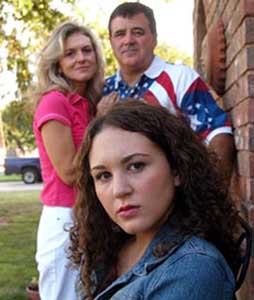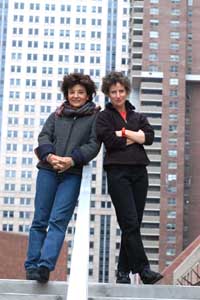Arts & Entertainment
The Education of Shelby Knox
Documentary focusing
on the sex education debate
kicks off summer film series
Published Thursday, 07-Jul-2005 in issue 915
Documentary focusing on the sex education debate kicks off summer film series
Adolescents in federally funded, abstinence-only sex education classes across the country are learning some shockingly false information: HIV can be spread via sweat and tears; abortion can lead to sterility and suicide; half the gay male teenagers in the United States have tested positive for the virus that causes AIDS.
Scarier yet is what these youngsters are not learning. In order to receive the funding – some $170 million dollars in fiscal year 2005 and a possible $38 million increase for 2006 – the programs may not discuss birth control, abortion or safe-sex practices. They ignore gay, lesbian, bisexual and transgender people, and topics like HIV and AIDS. Teens are taught that abstinence is the only option for unmarried people, and the only way to prevent pregnancies and sexually transmitted diseases.
That’s why a film like The Education of Shelby Knox is so important. In addition to highlighting this growing national debate, the documentary demonstrates the impact one person can have, encouraging action and inspiring dialogue on social issues.
Filmmakers Marion Lipschutz and Rose Rosenblatt documented one young woman’s opposition to the abstinence-only curriculum, and her resultant political and spiritual transformation. Shelby Knox, a devout Christian who pledged abstinence until marriage herself, became at 15 an unlikely advocate for comprehensive sex education and GLBT rights in her hometown of Lubbock, Texas.
The film will be presented at the Arts and Entertainment Center in North Park on Wednesday, July 13, as part of the San Diego Women Film Foundation’s Summer Film Series. The film foundation’s overall mission is to empower young women through positive media, and promote women filmmakers and their films.
“The purpose of the series is one, to show positive media – to put positive messages out there, to show role models like Shelby,” said film foundation Executive Director Renee Herrell. “It’s also to promote women filmmakers; one of the biggest reasons the foundation exists is to promote women filmmakers. The third thing is for the audience themselves – that we are providing arts and culture to the San Diego community.”
This first installment in the series kicks off with a reception at 6:00 p.m. featuring modern dance by the critically acclaimed dance troupe Xdrop, with works by choreographers Liliana Cattaneo and Tanya Blood Hinkel. Cattaneo, named one the top five local choreographers to watch by the San Diego Union-Tribune, said the dance program will complement the film.
“The best thing about what I do,” said Cattaneo, “is that people come and you have their undivided attention, and that’s a very powerful thing. What are you going to do with that time? What are you going to say?
“Our work is very universal, dealing with the self, self-struggle and struggles with society,” she said. “The film is about one woman struggling to have voice. We as an organization and as women also struggle to have a voice in the community, as well to make a difference.”
It seems Knox, an articulate, intelligent and passionate young woman, has found her voice – and also become a role model for other teens. Now a student of political science at the University of Texas in Austin, the self-described liberal feminist continues her activism in sex education and female reproductive rights, and hopes to some day run for national office.
“It’s always scary to see yourself as a role model because you see so many faults in yourself,” said Knox in a recent telephone interview from Texas. “I hope that I’m representative of a type of teen in America. I hope that other teens see me and say, ‘I can do that, too’ … That’s the effect that I hope I have on youth and empowerment.”
Though Lubbock County teaches abstinence as the only safe sex, it has one of the highest rates of teen pregnancy and sexually transmitted diseases in the nation. Texas public schools have been teaching abstinence-only sex education since 1995, when then-Gov. George W. Bush signed a law making Texas the third state to follow the curriculum.
But a recent report by Rep. Henry A. Waxman, D-Calif., found that youngsters taking abstinence-only courses in more than 100 federally funded programs frequently received medically inaccurate or misleading information. Out of the 13 most commonly used curricula for abstinence programs, 11 contained unproven claims, subjective conclusions or outright fallacies, according to the report.
Advocates of the abstinence approach counter that teaching young people about “safer sex” condones sexual activity. But nonpartisan researchers have found no measurable benefits to the abstinence-only model. And critics say the “just say no” approach to sex education may leave adolescents ill-equipped to protect themselves should they become sexually active. According to the latest data from the Centers for Disease Control, 61 percent of graduating high school seniors have had sex.
Abstinence-only programs also neglect the GLBT community, ignoring issues such as safer- sex practices for oral and anal sex, and increased risk levels for diseases. Many curricula only mention GLBT people and same-sex sexual activity in reference to promiscuity or disease. Programs that advocate waiting for marriage before having sex also marginalize gay and lesbian youth, who may not be able to legally marry.
Knox immediately saw the connection between gay rights and the struggle for comprehensive sex education. She aligned herself with the Gay Straight Alliance, which was suing the school district for the right to meet on campus and post signs on school property.
“I think there would be less discrimination if gay and lesbian issues were fully integrated in the curriculum,” said Knox. “I felt like it was a greater cause that everyone in the community needed to work for, and I was in position to do that.”
Ultimately, Knox hopes the film will spur interest – and perhaps action – in the issue, and that other young people find the courage to stand up for what they believe.
“Parents need to start looking into their kids’ sex education programs and see what they are and are not learning,” Knox said. “And teens need to realize we’re not an apathetic generation; that teens are standing up all across the nation to do important things. They need to find an issue that they care about, research it and then start doing something about it, because that’s the only way they’re ever going to change anything.”
The July 13 reception for the San Diego Women Film Foundation’s Summer Film Series takes place from 6:00 to 7:00 p.m., followed by the film screening. Tickets are $10 and include food by Pick Up Stix and drinks. The Arts and Entertainment Center is located at 3026 University Ave. in North Park. The Summer Film Series continues with a screening of The Heart of the Sea and musical guest Saba on Aug. 10, and Trumpetistically Clora Bryant along with spoken word on Sept. 14. For more information, visit this article online at www.gaylesbiantimes.com for a link to the film foundation Web site.
|
|
Copyright © 2003-2025 Uptown Publications




